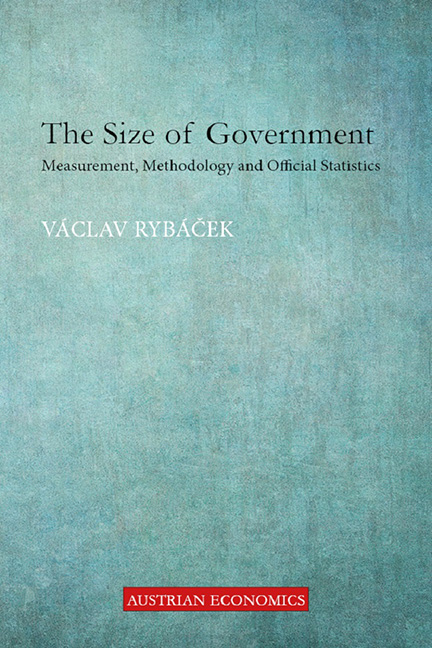Book contents
- Frontmatter
- Contents
- Introduction
- Chapter 1 The Size of Government in Economics
- Chapter 2 The Role of Measuring Government in Economic Policy
- Chapter 3 A Short Trip to the Past
- Chapter 4 The Current Approach
- Chapter 5 What’s Wrong with the Current Approach?
- Chapter 6 The Size of Government and GDP
- Chapter 7 Is the Size of Government Underestimated?
- Chapter 8 Recalculation of the Size of Government
- Conclusion
- Notes
- Bibliography
- Index
Chapter 1 - The Size of Government in Economics
Published online by Cambridge University Press: 09 August 2023
- Frontmatter
- Contents
- Introduction
- Chapter 1 The Size of Government in Economics
- Chapter 2 The Role of Measuring Government in Economic Policy
- Chapter 3 A Short Trip to the Past
- Chapter 4 The Current Approach
- Chapter 5 What’s Wrong with the Current Approach?
- Chapter 6 The Size of Government and GDP
- Chapter 7 Is the Size of Government Underestimated?
- Chapter 8 Recalculation of the Size of Government
- Conclusion
- Notes
- Bibliography
- Index
Summary
Let’s start with the question, why the discussion on the measurement of government should be important at all. Following fundamental changes in the field of mainstream economic theory in the first half of the twentieth century, the role of government in economic affairs has become one of the predominant concerns of economists. So, economic researchers have put a great deal of effort into finding out an optimal size or scope of government, which draws on mutual causal links between relevant macroeconomic aggregates like government expenditures and economic growth, or government indebtedness and inflation rates. Undoubtedly, statistics, that is the quantitative measurement of abstract economic concepts, is the sine qua non of empirical research.
To bring economic concepts into existence by way of appropriate quantifications is left almost exclusively to statisticians. Admittedly, after many decades of rapid development in economics and statistics, we have arrived at the point where economists rely on statistical quantifications, but are at the same time little aware of how these figures have been compiled. On the other hand, most statisticians have little idea of all the purposes for which the result of their work is used. This situation is apparently further enhanced by a precipitous development on both sides, i.e. a growing complexity of the methodology of macroeconomic data and a broadening of its use in economic policy.
In the case of macroeconomic aggregates, we are not talking about monetary categories easily observable. As Morgenstern (1963) reiterates, statistical observations are based on the constructed, deliberately designed and invented theory. The compilation carried out by professional statisticians is a lengthy and highly complicated process. Lack of information and methodological complexity creates an environment in which an occurrence of measurement errors is inevitable. In his famous book, Morgenstern (1963) further enumerates several sources of error negatively affecting the accuracy of economic calculations. For the sake of our argument, chiefly the lack of clear definitions of the government sector, one of the sources of errors stated by Morgenstern, is of vital importance. Morgenstern rightly notes that weak and unsteady definitions cannot provide a stable ground for reliable quantifications.
- Type
- Chapter
- Information
- The Size of GovernmentMeasurement, Methodology and Official Statistics, pp. 7 - 26Publisher: Agenda PublishingPrint publication year: 2019



